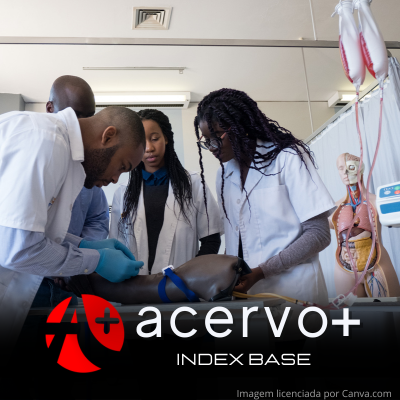Debriefing plus-delta na simulação em enfermagem
##plugins.themes.bootstrap3.article.main##
Resumo
Objetivo: Sintetizar as evidências científicas presentes na literatura sobre a utilização do método de debriefing plus-delta para educação baseada em simulação voltada à enfermagem. Métodos: Revisão integrativa realizada nas fontes de informação National Library of Medicine; National Institutes of Health; Scopus; Cumulative Index to Nursing and Allied Health Literature; Literatura Latino-Americana e do Caribe em Ciências da Saúde; Web of Science; Education Resources Information Center, com auxílio do Rayyan e análise por meio da Análise Temática. Resultados: Identificaram-se 676 estudos e destes cinco compuseram a amostra. Elaboraram-se duas categorias, a primeira intitulou-se Prática do debriefing Plus-Delta” e a segunda Benefícios do debriefing Plus-Delta para o ensino e aprendizagem em enfermagem. Considerações finais: Fundamentada em uma experiencia internacional de ensino, o debriefing plus-delta vem sendo realizado, geralmente, sem a associação de outras técnicas de debriefing, impactando positivamente no desenvolvimento de conhecimento e satisfação dos aprendizes, por meio da descrição dos pontos positivos (plus) e dos pontos a serem melhorados (delta) no desempenho do aprendiz.
##plugins.themes.bootstrap3.article.details##
Copyright © | Todos os direitos reservados.
A revista detém os direitos autorais exclusivos de publicação deste artigo nos termos da lei 9610/98.
Reprodução parcial
É livre o uso de partes do texto, figuras e questionário do artigo, sendo obrigatória a citação dos autores e revista.
Reprodução total
É expressamente proibida, devendo ser autorizada pela revista.
Referências
2. CARVALHO APV, et al. Avaliação do risco de viés de ensaios clínicos randomizados pela ferramenta da colaboração Cochrane. Diagnóstico e Tratamento, 2013; 18(1): 38-44.
3. CHENG A, et al. Embracing informed learner self-assessment during debriefing: the art of plus-delta. Advances in Simulation, 2021; 6 (22).
4. DUSAJ TK. Five Fast Fixes: Debriefing. Clinical Simulation Nursing, 2014; 10(9): 485-6.
5. GHARIBI KA, et al. Effect of Repeated simulation experience on perceived self-efficacy among undergraduate nursing students. Nurse Education Today, 2021; 106: 105057.
6. HARDER N, et al. Psychological outcomes of debriefing healthcare providers who experience expected and unexpected patient death in clinical or simulation experiences: A scoping review. Journal of Clinical Nursing, 2020; 29(3-4): 330-46.
7. JOHNSEN HM, et al. Developing a Serious Game for Nurse Education. Journal of Gerontological Nursing, 2018; 44(1): 15-9.
8. KAINTH R. Dynamic Plus-Delta: an agile debriefing approach centred around variable participant, faculty and contextual factors. Advancing simulation practice, 2021; 6(35).
9. KLAIR MB. The mediated debrief of problem flights. In: DISMUKES RK e SMITH GM. Facilitation and Debriefing in Aviation Training and Operations. Burlington, Vermont: Ashgate; 2000.
10. LAVOIE P, et al. Debriefing Approaches for High-Fidelity Simulations and Outcomes Related to Clinical Judgment in Baccalaureate Nursing Students. Collegian, 2019; 26(5): 514-21.
11. LEE BO, et al. Effects of simulation-based learning on nursing student competences and clinical performance. Nurse Education Practice, 2019; 41: 102646.
12. MACKENNA V, et al. Self-debriefing in healthcare simulation: An integrative literature review. Nurse Education Today, 2021; 102(104907).
13. MELNYK BM, FINEOUT-OVERHOLT E. Evidence-based practice in nursing & healthcare. A guide to best practice. Philadelphia, 2005; 3 (24).
14. MEZA PK, et al. Changing the landscape of obstetric resident education in low- and middle-income countries using simulation-based training. Intern Journal of Gynaecology Obstetrics, 2021; 154 (1): 72-78.
15. MILTON K. Primary Care Trust. Critical Appraisal Skills Programme. Making sense of evidence. CASP. London: Oxford; 2002.
16. MINAYO MC. Sampling and saturation in qualitative research:consensuses and controversies. Revista Pesquisa Qualitativa, 2017; 5(7).
17. NASCIMENTO JSG, et al. Clinical simulation for nursing competence development in cardiopulmonary resuscitation: systematic review. Revista Latino-Americana de Enfermagem, 2020; 28: e3391.
18. NASCIMENTO JSG, et al. Debriefing: desenvolvimento e validação de um roteiro para simulação do suporte básico de vida. Cogitare Enfermagem, 2021; (26).
19. NIU Y, et al. Effectiveness of simulation debriefing methods in nursing education: A systematic review and meta-analysis. Nurse Education Today, 2021; 107.
20. OUZZANI M, et al. Rayyan-a web and mobile app for systematic reviews. Syst Rev, 2016; 5(1).
21. PAGE MJ, et al. The PRISMA 2020 statement: an updated guideline for reporting systematic reviews. BMJ, 2021; 372(71).
22. RAO P. Introduction to debriefing. Update in Anaesthesia. 2022.
23. SANTOS CM, et al. The PICO strategy for the research question construction and evidence search. Revista Latino-Americana de Enfermagem, 2007; 15(3).
24. TYERMAN J, et al. A Systematic Review of Health Care Presimulation Preparation and Briefing Effectiveness. Clinical Simulation Nursing, 2019; 27(12).
25. URSI ES e GALVÃO CM. Perioperative prevention of skin injury: an integrative literature review. Revista Latino-Americana de Enfermagem, 2006; 14(1).
26. WEAVER A. The Effect of a Model Demonstration During Debriefing on Students’ Clinical Judgment, Selfconfidence, and Satisfaction During a Simulated Learning Experience. Clinical Simululation Nursing, 2015; 11(1): 20-26.
27. WHITTEMORE R e KNALF K. The integrative review: updated methodology. Journal of Advance Nursing, 2005; 52(5): 546-553.
28. WILBANKS BA, et al. Comparison of Video-Facilitated Reflective Practice and Faculty-Led Debriefings. Clinical Simulation Nursing, 2020; 42: 1-7.
29. XIMENES NETO FRG. Educação em enfermagem no Brasil: avanços e riscos. Enfermagem em Foco, 2019; 10(6): 4-5.

